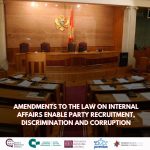On the Occasion of Frequented Violence and Threats of Violence
23/09/2009ANNOUNCEMENT ON THE OCCASSION OF THE BASIC STATE PROSECUTOR’S INDICTMENT OF JOURNALIST MIHAILO JOVOVIĆ
06/10/2009On the occasion of signing of the Optional Protocol to the International Covenant on Economic, Social and Cultural Rights (ICESCR)
HRA welcomes Montenegro signing the Optional Protocol to the ICESCR on 25th September in Geneva, and bearing in mind the importance of this document for the protection of human rights on the International level, appeals to the National Assembly to ratify it as soon as possible.The Protocol has been signed by twenty states to date (Argentina, Chile, Belgium, Ecuador, Finland, Gabon, Ghana, Guatemala, Luxembourg, Mali, Netherlands, Portugal, Slovakia, Slovenia, Solomon Islands, Montenegro, Senegal, Spain, Ukraine and Uruguay) and shell enter into force when ratified by ten states.
The Protocol will allow all individuals within the jurisdiction of Montenegro to request protection of rights provided by the Pact for the first time at the international level from the United Nations Committee on Economic, Social and Cultural rights, such as the right to work and fair working conditions, rights for setting up the syndicate and membership in them, to social security, to adequate conditions of housing and food-water and food, the protection of family, the protection of health in a broader sense and copyright protection trough the individual and join representations, when all legal remedies in the country are exhausted.
This way of international protection will be particularly precious bearing in mind the, unfortunately, limited jurisdiction of the Constitutional Court of Montenegro, which can only abolish acts of state bodies, rather than decide on violation of the rights and ensure for their protection by ordering the state bodies to provide access to water, food, shelter, etc.
Economic, social and cultural rights are inborn rights of every human being, inextricably tied to the dignity of every man, women and child, regardless of their nationality, ethnic, religious or other affiliation. “A child excluded from primary school because of school fees, a woman paid less than her male colleague for the same work, a family forcibly evicted from their home, a man left to starve when food stocks lie unused-these are all instances of individuals denied their economic, social and cultural rights”, stated the UN High Commissioner for Human Rights Navi Pillay.
Former SFR Yugoslavia ratified the ICESCR already in 1971, and it came into force in 1976, when ratified by the sufficient number of states.
The text of the signed Optional Protocol in English language and the text of ICESCR and the General Comments by the Committee on Economic, Social and Cultural rights in our language are available on the website of Human Rights Action www.hraction.org.







 English
English